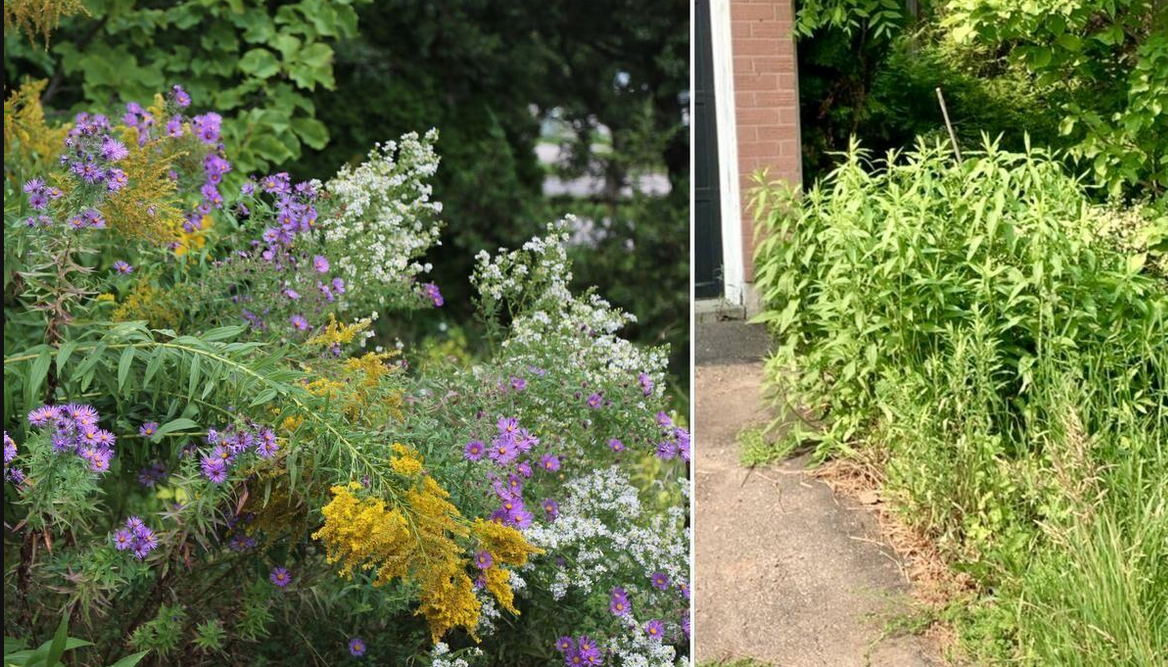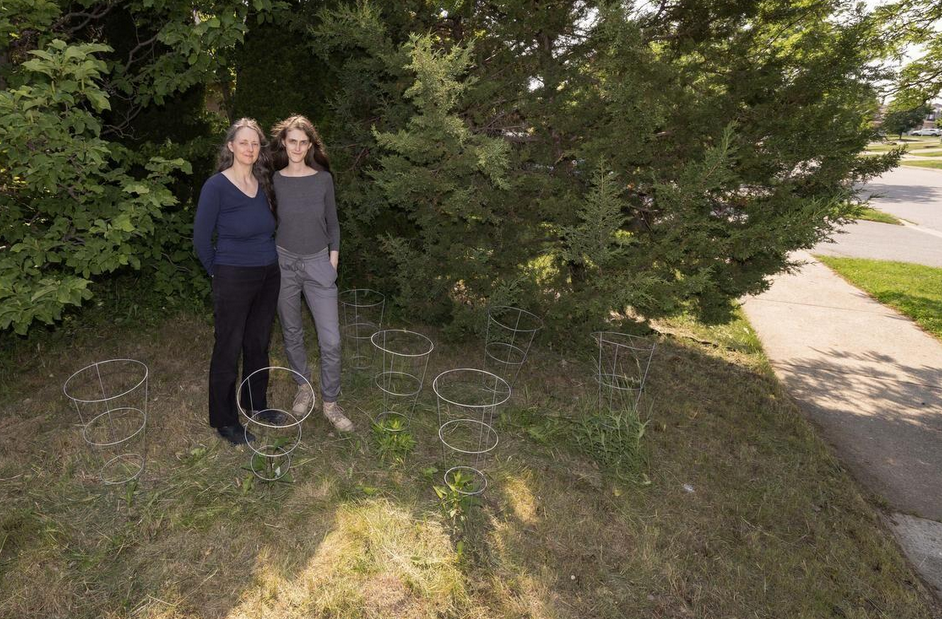 By Pepper Parr
By Pepper Parr
August 8th, 2023
BURLINGTON, ON
What do you do when seven people from city hall show up on your doorstep – no notice and tell you they are going to cut what they claim are weeds on your front lawn and back yard?
The group of seven didn’t bother to knock on the door – they just began cutting. This is the situation Karen Barnes found herself facing on June 20th.
Barnes decided in 2015 to create a natural garden, one that respected the environment and would become a place where Monarch butterflies would stop over on the annual migration to Mexico.
Her difficulty with the City started back in October of this year when she got a notice from the city about the plants in the garden.

On the left the garden in full bloom, on the right the garden which was described by city workers as nothing but weeds that they took out with a weed wacker.
Barnes has been in the house for 30 years; the natural garden was a decision she made eight years ago when it became clear to her that Climate Change meant changes in the way we were living on this planet were necessary.
In a media release sent to the Toronto Star exclusively Barnes said: “The law is very clear, I have a right to grow this garden consistent with my sincerely held beliefs. I’ve met with the City and hired an expert to demonstrate I’m complying with the By-law. I want an investigation into these bullying tactics.”
Karen Barnes is a sensitive soul. When she talks to people her natural gesture is a hand on their arm or shoulder. She said: “It’s kind of humiliating too, because this is our public-facing expression of our beliefs and people who are just coming by, they’re not going to know the city did this. They’re going to think it’s a decision we made and that’s not the expression that we want to have to the world.”
Karen Barnes, who has a master’s degree in ecology from McMaster University, said one of the crew members told her: “We’re just cutting the grass.” But to her and her daughter, it was the destruction of a habitat that has brought them both joy since 2015, when they first allowed native plants to return; an approach experts call “passive restoration” — and evolved into maintaining the naturalized space.

“Purple asters came, milkweed came and the bylaw at the time allowed for all this,”
“Purple asters came, milkweed came and the bylaw at the time allowed for all this,” she said, describing how the plants led to visits from endangered monarch butterflies and other species.
Barnes has known David Donnelly for a number of years. He is a lawyer specializing in environment issues – he handled the PERL (Protecting Escarpment and Rural Land) case against Nelson Quarry over their application for an extension of the land they could mine.
The joint tribunal that heard the case found for the PERL group.
Donnelly also worked with the people who wanted a stop put to the plans to cut several thousand trees on the Meridian Brick works people. While there was no definitive decision – so far nothing has been cut.
There was a point when, as ward 2 Councillor, Marianne Meed Ward was all over that issue with her support. As Mayor she hasn’t had much to say.
Donnelly got in touch with the people at City hall, explained the legislation that secured the rights of those who wanted a natural garden. At the time Donnelly thought the city now understood what they could and couldn’t do – and the issue seemed to have come to an end.
Then, on May 26, of 2023, the city issued a notice of non-compliance with several bylaws, including the 20-centimetre rule, with just 11 days to meet a deadline to rectify the alleged problems.
That 20 centimetre rule requires that the height of a plant cannot be more than 20 centimetres high.
On June 4th, Barnes got a letter from the City advising her that she had until June 6th to comply with the bylaw.
One June 20th seven people showed and began cutting the natural garden.

Karen Barnes on the left with her daughter Julia. The wire baskets on the lawn were where the naturalized plants were located. “We felt we were violated” said Karen
What the Barnes’s and her lawyer say is a purposeful, naturalized garden — restored and planted to help bees and butterflies, nature’s pollinators, and increase biodiversity in their corner of Burlington was permitted — according to the city, the garden was violating several bylaws.
After the City first notified Barnes that her yard was not in compliance back in October, she spoke with Donnelly, who in turn spoke with the city’s lawyer. Donnelly said he provided the case law allowing such spaces and, as requested, an expert report on the property’s naturalized area.
The Barnes family had maintained a yard of goldenrod, coneflower, wood poppy, purple asters and milkweed — that was until the City of Burlington sent crews to level what they called “weeds.”
Despite the talks taking place the City crew arrived with landscaping equipment and went to work, leaving sections of the front yard levelled as well as parts of the backyard. Karen Barnes and her daughter Julia said they were left feeling “violated.”
The growing the goldenrod, coneflower and wood poppy, along with other native species, were not in compliance with a rule to maintain all vegetation under 20 centimetres, among other infractions which the homeowners dispute. As a penalty, the city had threatened an astonishing $10,000-a-day fine until the yard was remedied to their standards. They added that a fine of $100,000 could be levied if Barnes tried to obstruct the City workers.

David Donnelly. prominent environment lawyer is representing Karen Barnes.
“Burlington has a deserved reputation for respecting the environment and homeowners that are doing something about the climate crisis by creating pollinator habitat, reducing the need for mowing, and other stewardship measures. Writing Ms. Barnes’ mortgage company is disgraceful conduct that needs to be investigated, as the by-law doesn’t give the City this authority”, Donnelly added.
Donnelly was quoted in the Toronto Star saying: “Giving butterflies a safe haven, you want to fine them $10,000 a day? It’s perverse.”
Barnes said: ““We want to show that you can work with nature and have a positive, supportive relationship.”
The city, for its part, says that despite allowances for naturalized areas in the city’s bylaw, the Barnes’ yard “did not meet the definition,” and that the City has the authority to enforce its bylaws on private property.
The municipal war over naturalized gardens and a focus on conformity is not unique to Burlington — though Donnelly called the threatened fine unprecedented.
These types of bylaw issues are usually driven by complaints — a neighbour who, maybe seeing the yard as an eyesore or unable to differentiate between weeds and pollinator species or complaints about what they think is a lack of maintenance.
According to Burlington’s own lot-maintenance bylaw, a naturalized area is defined as “an area or vegetation deliberately planted or cultivated with one or more species of wildflowers, shrubs, annuals, perennials, ornamental grasses, or combination of them, that is monitored and maintained by a person.”
Such areas, the bylaw says, are excluded from the rule to maintain lots with plants more than 20 centimetres or less — many native species naturally grow much taller, like the goldenrod stalks still standing in the front yard.
As outrageous as this sounds – it gets worse.
Today, the 8th of August Kerry Davren starts her new job is as Director of Bylaw Enforcement. Prior to the promotion Davren was the city’s manager of bylaw enforcement. At that time she said the order issued to the Barns said that the city may carry out the work at the homeowner’s expense if it was not complied with, as allowed by the city’s bylaws.

Kerry Davren, with 14 years of experience starts her new job is as Director of Bylaw Enforcement today.
Davren said bylaw officers are “appointed as weed inspectors in accordance with the Weed Control Act” which requires certification and training on plant identification, and sent a photo of the property before “the weeds were trimmed.”
Davren did not respond to a question about whether it’s common practice to contact a homeowner’s mortgage company.

Brynn Nheiley, Executive Director of Community Planning, Regulation and Mobility
Brynn Nheiley, Executive Director of Community Planning, Regulation and Mobility explains why she hired Kerry Davren “Kerry’s breadth of experiences will be a great asset to the City of Burlington as she leads the newly established Bylaw Compliance Department. Demonstrating compassion, logic and professionalism, Kerry continues to highlight and respond to evolving needs of the Burlington community. She is highly respected by her staff, City Council and the Burlington Leadership Team.”
Given the performance by Davren when she was a Manager one wonders what she will do is as a Director.
The case law, which Donnelly provided to the City of Burlington back in the fall, includes a 1990s Toronto case in which bylaws were successfully challenged on the basis that they infringed the Charter right to freedom of expression. Donnelly explained these rulings set out that as long as a naturalized garden is a “conscientious” or purposeful expression of one’s beliefs, it is permitted under Canadian law.
Donnelly said they plan to challenge the City of Burlington’s application of the bylaw in court as unconstitutional. He added that it’s unclear what fines or costs the Barnes currently face.
When there is an issue that a community finds is unfair support comes quite quickly.
A Fund Raiser has been started to raise the $25,000 they feel will be needed to take the case to Court and any appeals that might ensue.
 Karen Barnes has chosen Small Change as their fund raiser. Click on the Small Change Fund image if you want to support getting to the bottom of what happened and why.
Karen Barnes has chosen Small Change as their fund raiser. Click on the Small Change Fund image if you want to support getting to the bottom of what happened and why.

Karen Barnes has yet to see the Barbie movie.
The interview with Barns was lengthy, interrupted more than once when she asked for a moment to get a grip on her emotions. We wanted to know what Karen did in her spare time; what did she read, where did she spend her spare time? . She paused and I wasn’t sure she was going to answer the question so I asked if she had yet seen the Barbie movie that is a bit of a rage right now.
She responded – I didn’t know there was a Barbie movie – why would someone do something like that – and then she burst into laughter.
This is going to be an interesting story – it certainly has legs.





















Im not understanding how a planted garden can be so contentious when an overgrown lot on a main street-Ghent and Brant-for instance, can be allowed. Can someone tell me tge answer to this question?
I’m likely the only person who doesn’t hate the city’s action. On the city’s side they have the responsibility to enforce the bylaw and to be fair the picture without the plants flowering, does look like weeds. I wouldn’t want to live next door. It seems the city has been reasonable for some time until now, so what has caused the escalation? I think there is more of a back story here, which we will never know because her neighbor complaintants wiil not want to talk. I guess this will be determined who is right in court, with taxpayers footing the bill if the city is at fault.
https://globalnews.ca/news/9888237/burlington-naturalized-garden-razed-city-threatens-fines/
The neighbours have no problem talking about it.
This a qualitative difference between a garden with natural plants and flowers versus one that is over run with weeds. By all accounts Ms. Barnes’ garden is carefully curated and attractive.
If the City wants to mount a frontal attack weeds contact me and I’ll introduce them to my neighbour down the street. Mind you, they’ll have to wade through the garbage and crap all over the property first.
Somebody obviously doesn’t like the garden. Bylaw only responds to complaints.
I wonder how much fertilizer and water the Barnes use to maintain their garden? Probably far less than those with neatly manicured lawns! We have to get over ourselves and start giving back to nature.
Meanwhile the city creates a new paved urban path along the Maple hydro line, complete with lane markings and road side instructions, having levelled a lot of woody copses and a variety of native species so people can walk in an open field. A path through there is a lovely idea, making it into an urban street with painted lanes is not. No wonder some people think we have a coyote problem – we took away their natural habitat, and continue to do so. The latest plans of a “path” from Emerald to Victoria Street will probably take the same sterile, ugly form certainly not “earth-friendly” either.
I also have a neighbour who can’t get the city to do anything to stop the people next door from emptying their entire back downspout across their driveway and onto her property where it has erodes lawn, spreads gravel and ponds in most rainfalls. But the city is unable to help. Something is wrong with our priorities…..
I find this his whole situation appalling on the part of our City Council and their staff. Don’t you have more important things to spend your time and our tax payer dollars on?? I agree, that City Council should not only apologize to this property owner for what they did, but also replace and plant all of the native Plants that were incorrectly destroyed by our City Council at their expense.
If the accounts are true then the City’s behaviour is appalling by any standard. I think that few will argue that. What concerns me is that actions of this nature do not occur in an ‘executive vacuum’. At the very least Ms. Davren’s Director and the City Manager would have been aware – as would Legal and, quite possibly, the Mayor. So, is this the type of egregious, unthinking direction that City staff are given and that is considered to be acceptable? Where are the experienced and calmer voices that needed to prevail? Just as an aside, how does the Deputy Mayor of Climate Change reconcile this sort of action with his ‘earth-friendly’ mandate? The bees and butterflies will get you for this Rory.
Davren said bylaw officers are “appointed as weed inspectors in accordance with the Weed Control Act” which requires certification and training on plant identification, and sent a photo of the property before “the weeds were trimmed.””
Except they weren’t weeds.
How does Davren respond to this, from this weekend’s large Toronto Star article on this embarrassing action by City of Burlington staff: “In her report dated November 2022, Lorraine Johnson — a self-described “cultivation activist,” author and consultant on natural gardens — details how upon inspecting the Barneses’ garden she found no noxious weeds as defined by the Ontario law. She observed new beds of topsoil that Barnes said she purchased and seeded with new native species and other attempts to maintain the garden, such as stringing up plants to prevent them from bending over onto walkways and neighbouring properties.
“I evaluated the vegetation community/communities, and determined that, based on the plants present, the landscape consists of a deliberately planted or cultivated naturalized area,” she wrote. Despite this, Johnson said the city’s supervisor of bylaws, Mike Donnelly (no relation to David), who was present for the inspection, said he believed the yard was “unkempt” and “referred repeatedly to the ‘weeds’ present” though he could not clarify what plants he considered to be “weeds,” noting that he is “not a weed expert.””
So, our “weed inspectors” can’t clarify which plants are weeds and they note they aren’t “weed experts”.
This whole sorry mess is so indicative of our City Hall. What about our much-touted “climate emergency declaration?” Don’t we have a Deputy Mayor of the Environment? You’d never know it. We have staff coming down on residents, threatening unprecedented fines and showing up en masse to ruin a private garden. When the resident’s lawyer sent the city a letter, months prior, with information and case law, he received no reply. Another typical COB move.
Will anyone on council have anything to say? Can staff explain why they contacted the mortgage company? It was noted the Star reporter asked her and she didn’t respond. What a disgraceful way to treat people.
A real head shaker. Thank goodness Karen Barnes is standing up to the City By-law crew. A crew who don’t seem to be around when needed to deal with after hours construction noise down town; noise that shakes the windows of homes surrounding Spencer Smith; air B&B situation that caused so many problems until the City finally took the matter to court and put a stop to the issues; noisy vehicles that almost burst the ear drums, but can unashamedly and without apology destroy efforts that we should all be thankful for. Yes, a real head shaker!!!!!!
The Mayor and City Manager need to intervene and apologize and cancel any fines.